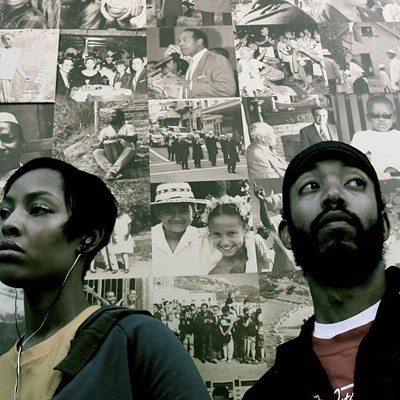That stated, Larkin Grimm is an amazingly talented singer, songwriter and multi-instrumentalist whose raw, dynamic and sometimes hallucinatory songs effectively communicate a perspective unlike anyone else's.
"I definitely do have a different way of seeing the world," Grimm says on her cell phone while enjoying the view somewhere in the Badlands of South Dakota. "I'm going to school to become a psychic and am apprenticing under three shamans at the moment. That's where my path lies, as it were."
Grimm's on a tour to promote her third album, Parplar, and that path brings her to Tucson for a gig on Friday, March 13. She'll do a solo acoustic set between local act Space Over Desert and the psychedelic group Sleepy Sun.
Grimm says communicating the differences between people within a shared reality is where art happens.
"I think that a lot of what music is, is what comes out of people when they are free to do as they like and think, and are being their honest selves. All humans are pretty much the same, but each of us thinks and feels and perceives things differently. So we have a collective unconsciousness to tap into, but also, we are each unusual creatures, and music is a great forum for bringing that out."
Grimm was born 27 years ago to multicultural parents in Memphis, Tenn. When she was a small child, her family claimed membership in a spiritual commune called The Holy Order of MANS. When they left the order, Grimm's parents relocated to the Appalachian Mountains in Georgia, where her father ran a folk-music store.
Grimm later traveled widely, going as far as Alaska and often hitchhiking. She also spent some time studying art at Yale University before discovering her voice in music.
Her haunting, emotional and sometimes graphic songs actually feature different voices: She can croon like a folk diva, chirp like a bird, wail like a witch or multi-track her voice until it becomes a children's choir. It's a unique instrument, one meant for her material specifically, she says.
"I never sing covers. My voice is something that I have been given in order to present certain ideas through my music. I learned how to sing during a ceremony in the Native American church. Suddenly, I could sing, and never did before."
A veteran of the band Dirty Projectors, she's also shared bills and stages with Devendra Banhart, Entrance, The Microphones, Viking Moses, and Old Time Relijun.
Parplar was released this past October by the independent label Young God Records, which is owned and operated by Michael Gira of Angels of Light and Swans fame.
While growing up, Larkin found positive female role models in music. She counts them off: "Björk, Kim Gordon of Sonic Youth, Debbie Harry of Blondie, Kate Bush, Yoko Ono, Laurie Anderson. Even Courtney Love, she was really a rebel at one time. And Patti Smith--well, she really is a shaman."
Grimm appreciates the legacy of these performers, but she feels we've got a long way to go. "All of these women are very intelligent and powerful artists, but these days, the bullshit has taken over, and in general, the female image in popular culture is all negative."
Many of Grimm's songs sound as if they are part of the centuries-old tradition of grisly fairy tales and fables. Which makes sense.
"Those were definitely something that inspired me as a kid. I was obsessed with Grimms' fairy tales," she says. "Supposedly, my father's family was descended from the Brothers Grimm, which partly led to my fascination, I'm sure. My mom read all the original Grimms' fairy tales to me when I was small, and pretty soon, I was wanting to go out and have those kind of exciting adventures myself."
But those tales also were "challenging" to Larkin, since they were also from the perspective "of a handsome hero, not a girl like me," she said.
She had to create her own adventures in music, and her family's music store offered the opportunity.
"All these old folk musicians would come in and chuckle to see a girl behind the counter, raising their eyebrows. They didn't think I could play, but when I did, they didn't believe the sound that came out of the guitar."










